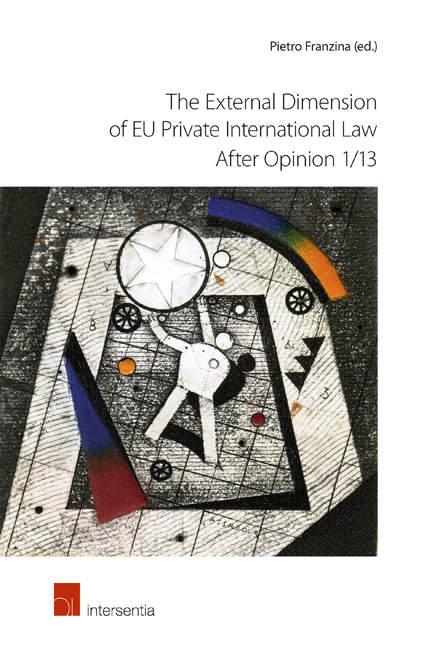Book contents
- Frontmatter
- Preface
- Contents
- PART I THE INTERNATIONAL PROJECTION OF EU PRIVATE INTERNATIONAL LAW - SOME BASIC ISSUES
- PART II OPINION 1/13 AND ITS IMPLICATIONS
- A Critical Analysis of the Judicial Activism of the Court of Justice of the European Union in Opinion 1/13
- The Implications of the European Union's Exclusive Competence with Regard to the Child Abduction Convention
- Consequences of Opinion 1/13 on the Acceptance in the EU of Accessions to the Hague Child Abduction Convention
- International Agreements on Private International Law Matters Not Covered by EU Legislation - Which Test Should Be Adopted to Assess the Competence of the EU?
- PART III THE CHANGING FEATURES OF EU EXTERNAL RELATIONS IN THE AREA OF PRIVATE INTERNATIONAL LAW
- PART IV EU LEGISLATION ON PRIVATE INTERNATIONAL LAW AND EXTRA-EUROPEAN SITUATIONS
A Critical Analysis of the Judicial Activism of the Court of Justice of the European Union in Opinion 1/13
from PART II - OPINION 1/13 AND ITS IMPLICATIONS
Published online by Cambridge University Press: 15 December 2017
- Frontmatter
- Preface
- Contents
- PART I THE INTERNATIONAL PROJECTION OF EU PRIVATE INTERNATIONAL LAW - SOME BASIC ISSUES
- PART II OPINION 1/13 AND ITS IMPLICATIONS
- A Critical Analysis of the Judicial Activism of the Court of Justice of the European Union in Opinion 1/13
- The Implications of the European Union's Exclusive Competence with Regard to the Child Abduction Convention
- Consequences of Opinion 1/13 on the Acceptance in the EU of Accessions to the Hague Child Abduction Convention
- International Agreements on Private International Law Matters Not Covered by EU Legislation - Which Test Should Be Adopted to Assess the Competence of the EU?
- PART III THE CHANGING FEATURES OF EU EXTERNAL RELATIONS IN THE AREA OF PRIVATE INTERNATIONAL LAW
- PART IV EU LEGISLATION ON PRIVATE INTERNATIONAL LAW AND EXTRA-EUROPEAN SITUATIONS
Summary
INTRODUCTION
On 14 October 2014 the Grand Chamber of the Court of Justice of the European Union (CJEU) decided that the EU has exclusive competence to accept the accession of a non-EU State to the Hague Convention on the Civil Aspects of International Child Abduction of 25 October 1980. The Court's judgment coincides with the views of AG Jaaskinen, the Commission, the European Parliament and the Italian Government. The French, Greek and Polish Governments argued before the Court that the EU has no external competence in this matter whilst sixteen Governments (Austria, Belgium, Cyprus, Czech Republic, Estonia, Finland, Germany, Ireland, Latvia, Lithuania, Portugal, Romania, Slovakia, Spain, Sweden and United Kingdom) and the Council argued that the EU does not have exclusive external competence in this matter.
Given the weight of advice to the Court against exclusive external competence it is reasonable to expect a carefully reasoned opinion from the Court justifying its ‘minority’ decision. Sadly the Court fails to meet this legitimate expectation. On the question of the existence of EU competence the Court devotes two paragraphs of its Opinion. The Court does not properly set out the criteria for external competence found in Article 216 TFEU and it does not clarify under which aspect of Article 216(1) TFEU the competence arises. It does not set out, far less address, the arguments of France, Greece and Poland as to why the EU has no external competence. In relation to exclusive external competence the Court does at least set out the three criteria in Article 3(2) TFEU and makes it clear that the case turns on the third criterion: whether the acceptance of third State accessions to the Hague Child Abduction Convention ‘may affect common rules [of EU law] or alter their scope’. However, the Court fails to give reasons as to why its pre-Lisbon case law on ‘largely covered area’ and ‘foreseeable future developments’ is still relevant to determining this third criteria now that the Treaty (since Lisbon) defines exclusive external competence rather than the matter being one that had purely and simply been created by the Court through its case law.
- Type
- Chapter
- Information
- Publisher: IntersentiaPrint publication year: 2016

